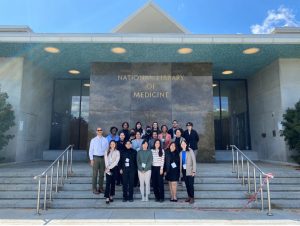May
28

Posted by NNLM Region 7 on May 28th, 2025
Posted in: Blog, Data, NLM, NLM Resources
I attended the Data Internship Summit with the National Center for Data Servies (NCDS) in Washington, D.C. from April 15th through April 17th, 2025. This summit provided insight into the daily tasks and skills needed for those working in data librarianship, networking opportunities, as well as tools and resources to bring back to our institutions. We had the opportunity to visit the Library of Congress, National Library of Medicine, and the National Institute of Health Clinical Center.
 The three days were spent with the past NCDS interns from the last three years. The Data Internship allows future librarians to gain practical experience to work in data librarianship, especially in the fields of health science and academia. The projects worked on include data cleaning, analyzation, visualization, and curation. It runs from June-August every year.
The three days were spent with the past NCDS interns from the last three years. The Data Internship allows future librarians to gain practical experience to work in data librarianship, especially in the fields of health science and academia. The projects worked on include data cleaning, analyzation, visualization, and curation. It runs from June-August every year.
Day 2
The second day of the Data Summit was spent at the National Library of Medicine. We had the opportunity to hear directly from leaders who work at the NLM. These speakers shared wonderous insight, first-hand experience in the field, and learning opportunities with our group.
One of the first speakers we heard from was Dianne Babski (Director, User Services and Collection Division). One item mentioned by Babski was the idea of standardized data. Having these standards will assist those working with data to have a seamless process when doing our work. Data standards allow for consistency, opportunity for sharing and reuse, as well as allowing data curators and researchers to be on the same page when working together. As stated by Babski, data is central to everything we do and learning about it is necessary to our future in libraries. You can read more about data standards here. Babski also expressed how we need to truly harness AI to help expand user experiences and how it can assist us when creating interactive interfaces to give access to literature for all languages and levels of reading comprehension.
Kathel Dunn (Coordinator, Associate Fellows Program) had informed our group on details on a few opportunities for aspiring data librarians. These included the NLM Associate Fellowship Program, LOC Librarians in Residence, ACRL Residency Interest Group, and the Annual MeSH Webinars. She had our group participate in an exercise to prepare us for introducing ourselves in professional settings in our future librarianship careers. It also gave us interns to reflect on the skills we have already obtained.
We were honored to hear from many speakers from the NLM, but the last one I will mention is Lisa Federer (Acting Director, Office of Strategic Initiative). One of the biggest lessons from her talk was to “embrace lifelong learning.” Federer taught R (a free software for statistical and computing graphics) to many people, including hundreds of scientists. She began the Data Science Program at NIH and expressed that we can also start a data center at our own institutions. On the topic of AI being popular in libraries at this point in time, Federer also let us know that there can be opportunities for data librarians to use AI for coding assistance, but let it be known that we also need to obtain the skills to be able to point out when AI is not correct when used for a coding task.
Throughout the day, my fellow interns and I had the opportunity to learn more about some of the innovative tools the NLM has to offer. Here is a list of a few of those tools:
Submitted by: Kimberly G. Carlo